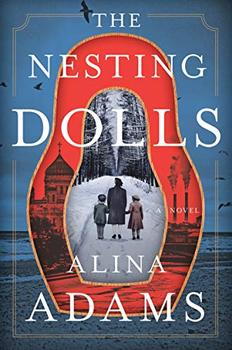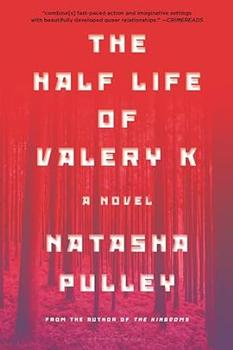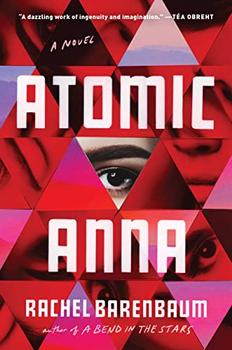Summary | Excerpt | Reviews | Beyond the book | Read-Alikes | Genres & Themes | Author Bio

The Nesting Dolls by Alina Adams opens in 2019, at an anniversary party celebrating 45 years of marriage between Baba and Deda. On this joyous occasion, family and friends toast the happy couple and wish them many more years together. Things quickly turn sour, however, when a particular gift proves to be not only unexpected but unwanted. Baba surprises everyone by hurling the gift to the ground. And so begins a multigenerational narrative of family, suffering and hope.
The novel is divided into three books following three women within the family: Daria in the 1930s, Natasha in the 1970s and Zoe in 2019. Through the stories of these women who are related, Adams shows how events experienced by earlier generations can significantly affect those that come later. The main characters are very different from one another, both because of where they live and because of their specific histories, but their narratives work together to create a single story of a family whose women know how to fight and make their own choices, even if those choices don't always seem right at the time.
Dvora Kaganovitch, known as Daria, has the life her mother always wanted for her: a loving marriage, two beautiful daughters and as good of a home as anyone in the Soviet Union. But one misheard conversation is enough to land her family in a Siberian gulag, where she must make one hard choice after another to ensure their survival. Time after time, Daria willingly puts herself into dangerous situations to take care of her daughters, but not even a mother's selfless love is enough to stand against the callousness of life in Siberia.
Daria's story is a reflection on motherhood, and also the heinousness and corruption of Soviet life under dictator Joseph Stalin. Alyssa, Daria's oldest daughter, is traumatized by her time in the gulag and her realization that even following the rules isn't enough to stay safe. Unlike her mother, who accepts the consequences of her choices and continues to make hard, sometimes illegal decisions in order to save her family from Hitler's invading forces, Alyssa avoids doing anything that could lead to trouble. Years later, her fear fuels rebellion in her own daughter, Natasha.
Natasha Crystal is a brilliant mathematician eager to begin her studies at Odessa University in 1970. She confidently sits for the entrance exam, but an anti-Semitic policy (see Beyond the Book) results in a failing grade and rejection. Dreams dashed, Natasha stumbles upon a group of young men and women eager to push back against the Communist party, and their actions give her not only a chance at revenge but a chance to reject her mother's strict rules. Her rebellion is dangerous in the Soviet Union of the 1970s, where it's still common to be sent to Siberia or disappear altogether for minor offenses, and being Jewish comes with added risk. Yet Natasha chooses to join her friends' cause and fight the system, even if she's more interested in spending time with the group's handsome leader than in speaking out against communism.
In choosing to fight, Natasha reflects her grandmother and her willingness to make dangerous decisions, though while Daria fought to protect her family, Natasha's motivations are less altruistic. When the group's plans fall apart, so do Natasha's dreams for her future. Finding herself alone and in a desperate situation, she is forced to choose safety and certainty, but the bitterness of her situation stays with her, even decades later as she is surrounded by family and friends in America.
Zoe Venakovsky, Natasha's granddaughter, feels suffocated by her family and their expectations. Although they typically mean well, Zoe is aware that the choices available to her as a woman in New York City in 2019 are very different from those in the Soviet Union in decades past. Nonetheless, she feels the weight of her family history, a weight that keeps her from making her own choices and from feeling truly American.
Perceptions of being between countries or cultures are common among first- and second-generation Americans, and for Zoe, this conflict is most prevalent in romantic relationships: She feels as if any boyfriend she chooses needs to meet her family's checklist for an appropriate husband, yet she finds her heart leading her towards someone else. Surprisingly, it's Baba Natasha who helps Zoe gain a sense of belonging by telling her own story. Natasha demonstrates the importance of sharing family history and proves the old adage that those who cannot remember the past are condemned to repeat it; by letting go of her anger and finally accepting the truth, she helps Zoe see that she should not make choices based on her family's expectations but rather on her own hopes and desires.
The stories of Daria, Natasha and Zoe fit into one another like the nesting dolls of the book's title. Daria's and Alyssa's experiences in Siberia indirectly lead to Natasha's rebellion, and Natasha's rebellion and subsequent immigration mean that Zoe is born in America with all the freedoms that entails. However, it's not until the women of the family finally begin to share their stories with one another that they realize the importance of the past, and that sometimes getting what you need is better than getting what you want.
Adams has created a beautiful story containing rich descriptions, impossible decisions and a family filled with both exasperation and love. The Nesting Dolls is brimming with history and complex relationships that will satisfy fans of multigenerational sagas and historical fiction alike.
![]() This review was originally published in The BookBrowse Review in August 2020, and has been updated for the
August 2021 edition.
Click here to go to this issue.
This review was originally published in The BookBrowse Review in August 2020, and has been updated for the
August 2021 edition.
Click here to go to this issue.

If you liked The Nesting Dolls, try these:

by Natasha Pulley
Published 2024
From the author of The Watchmaker of Filigree Street and The Kingdoms, an epic Cold War novel set in a mysterious town in Soviet Russia.

by Rachel Barenbaum
Published 2023
From the author of A Bend in the Stars, an epic adventure as three generations of women work together and travel through time to prevent the Chernobyl disaster and right the wrongs of their past.




Show me the books he loves and I shall know the man...
Click Here to find out who said this, as well as discovering other famous literary quotes!
Your guide toexceptional books
BookBrowse seeks out and recommends the best in contemporary fiction and nonfiction—books that not only engage and entertain but also deepen our understanding of ourselves and the world around us.